
Pierre Carlet de Chamblain de Marivaux, commonly referred to as Marivaux, was a French playwright and novelist.

The Gambler is a short novel by Fyodor Dostoevsky about a young tutor in the employment of a formerly wealthy Russian general. The novel reflects Dostoevsky's own addiction to roulette, which was in more ways than one the inspiration for the book: Dostoevsky completed the novel in 1866 under a strict deadline to pay off gambling debts.
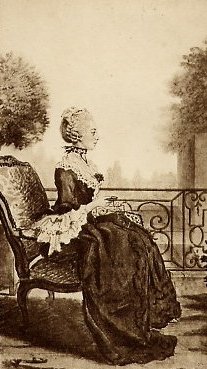
Jeanne Julie Éléonore de Lespinasse was a French salon holder and letter writer. She held a prominent salon in Paris during the Enlightenment. She is best-known today, however, for her letters, first published in 1809, which offer compelling accounts of two tragic love affairs.

Evelina, or the History of a Young Lady's Entrance into the World is a novel written by English author Fanny Burney and first published in 1778. Although published anonymously, its authorship was revealed by the poet George Huddesford in what Burney called a "vile poem".

Sentimental Education is a novel by Gustave Flaubert. The story focuses on the romantic life of a young man named Frédéric Moreau at the time of the French Revolution of 1848 and the founding of the Second French Empire. It describes Moreau's love for an older woman based on the wife of the music publisher Maurice Schlesinger, who is portrayed in the book as Jacques Arnoux. The novel's tone is by turns ironic and pessimistic; it occasionally lampoons French society. The main character often gives himself over to romantic flights of fancy.

Victor de Riqueti, Marquis de Mirabeau was a French economist of the Physiocratic school. He was the father of Honoré, Comte de Mirabeau and André Boniface Louis Riqueti de Mirabeau. He was, in distinction, often referred to as the elder Mirabeau as he had a younger brother, Jean-Antoine Riqueti de Mirabeau (1717–1794).
A parvenu is a person who is a relative newcomer to a high-ranking socioeconomic class. The word is borrowed from the French language; it is the past participle of the verb parvenir.
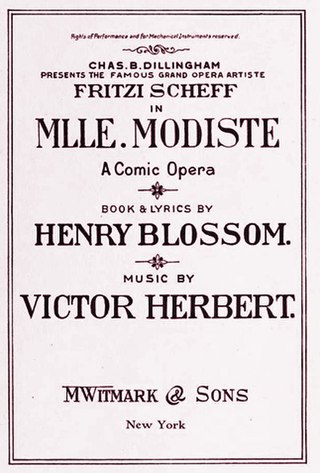
Mlle. Modiste is an operetta in two acts composed by Victor Herbert with a libretto by Henry Blossom. It concerns hat shop girl Fifi, who longs to be an opera singer, but who is such a good hat seller that her employer, Mme. Cecil, discourages her in her ambitions and exploits her commercial talents. Also, Fifi loves Etienne de Bouvray, who returns her love, but his uncle, Count Henri, opposes their union. The operetta features the song "Kiss Me Again".

Amélie-Julie Candeille was a French composer, librettist, writer, singer, actress, comedian, and instrumentalist.

Daddy's Dyin' ...Who's Got the Will? is a 1990 American ensemble comedy-drama film.
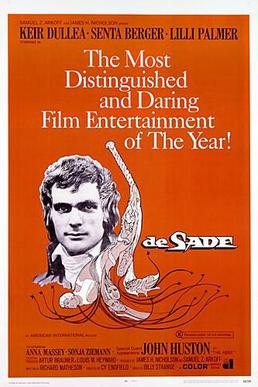
De Sade is a 1969 American-German drama film directed by Cy Endfield and starring Keir Dullea, Senta Berger and Lilli Palmer. It is based on the life of Donatien Alphonse François, Marquis de Sade, named Louis Alphonse Donatien in the film.
Tom Bertram is a supporting character in Jane Austen's 1814 novel, Mansfield Park. He is the elder son and heir of Sir Thomas Bertram, a baronet and wealthy landowner in Northamptonshire, who also owns an estate in Antigua.
The Quinault family were French actors, active in the first half of the 18th century.

Jeanne-Françoise Quinault was a French actress, playwright and salon hostess.

The Amorous Adventures of Moll Flanders is a 1965 British historical comedy film directed by Terence Young and starring Kim Novak, Richard Johnson, and Angela Lansbury. It is based on the 1722 novel Moll Flanders by Daniel Defoe.
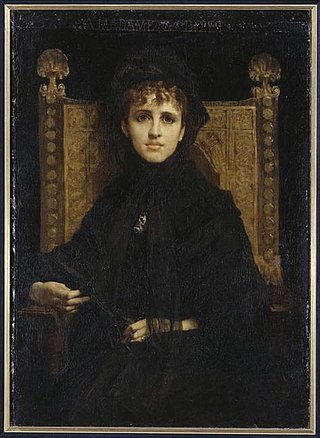
Marie-Geneviève Raphaëlle Halévy-Bizet-Straus was a French salonnière who was the wife of composer Georges Bizet. She inspired Marcel Proust as a model for the Duchesse de Guermantes and Odette de Crécy in his novel À la recherche du temps perdu (1913).

The Lizzie Bennet Diaries is an American web series adapted from Jane Austen's 1813 novel Pride and Prejudice. The story is conveyed in the form of vlogs. It was created by Hank Green and Bernie Su, produced by Jenni Powell and stars Ashley Clements, Mary Kate Wiles, Laura Spencer, Julia Cho and Daniel Vincent Gordh. It premiered on a dedicated YouTube channel on April 9, 2012, and subsequently concluded when the 100th episode was posted on March 28, 2013.

The Belle of Brittany is an Edwardian musical comedy in two acts set in 'Daffodil Time' in rustic 18th-century Brittany. It premiered at the Queen's Theatre in London on 24 October 1908. The music is by Howard Talbot and Marie Horne, to a book by Leedham Bantock and P. J. Barrow, with lyrics by Percy Greenbank. A Broadway production opened at Daly's Theatre in New York in November 1909 and ran for 72 performances. It featured Josephine Brandell and Margaret Dumont in early roles.
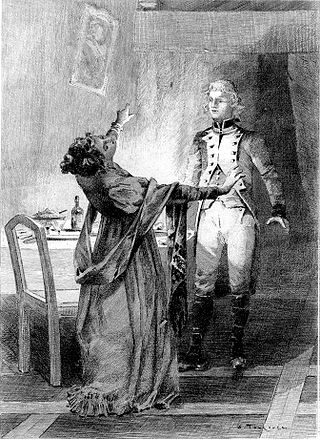
Adieu is a short story by Honoré de Balzac. It was published in 1830 in La Mode. It is one of the Études philosophiques of La Comédie humaine.















